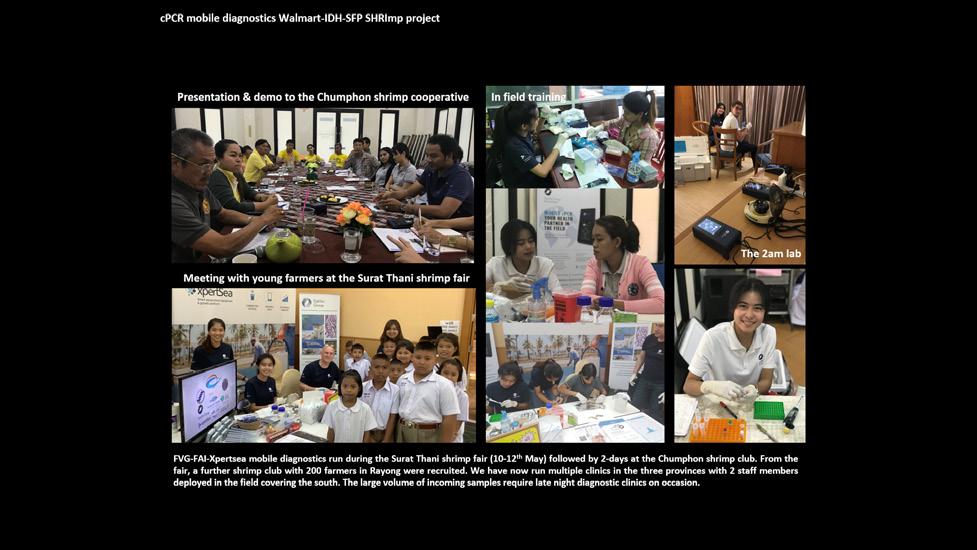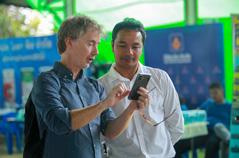
3 minute read
Is EHP now the key health concern for Asian shrimp producers?
While key to its management are strict biosecurity and disease surveillance practices, infection rates in tested ponds have risen with an average infection rate of 84.8% in 2019 and 93.5% throughout the first half of 2020.
Enterocytozoon hepatopenaei (EHP), a fungal microsporidian parasite commonly infects the hepatopancreas of the whiteleg shrimp (Penaeus vannamei). It is now arguably the key health concern for many producers across Asia. The ingestion of spores results in the infection of epithelial cells lining the tubules of the hepatopancreas. The subsequent proliferation and release of spores either by exocytosis or consequential cell breakdown, impacts on the digestive capacity of shrimp, resulting in slow growth and a notable variation in the size of stock. Chronic infections can lead to the loss of stock.
Controlling EHP in farm environments is a challenge. The key to its management lies in strict biosecurity and disease surveillance practices, i.e. in the rigorous disease testing of stock, feeds and water at each point in the production chain; avoiding the introduction of infected batches of post larvae and water into ponds and avoiding the overstocking of culture systems. It is also ensuring effective water and waste management and the comprehensive disinfection of ponds between crop cycles. As the original source of EHP has as yet to be determined, it is important that all alien organisms are excluded and their entry into culture systems are prevented. Likewise the on-farm movement of equipment between ponds should be avoided where possible unless robust disinfection procedures are in place. The number of shrimp, the sampling strategy and the diagnostic methods used, are appropriate for the sensitive and confident early detection of infections.
SHRImp
The disease management component of the Shrimp Health Resources Improvement project (SHRImp), a project funded by IDH-the Sustainable Trade Initiative and the Walmart Foundation and managed by the Sustainable Fisheries Partnership (SFP) and ThinkAqua, is conducted by a collaborative team of scientists from Benchmark R&D (Thailand), FAI Farms Limited and INVE Thailand who have set up mobile shrimp health clinics in three Thai provinces to support farmers in their shrimp health testing needs. The clinics operating out of the shrimp clubs offer health evaluations and molecular disease testing for early mortality syndrome/acute hepatopancreatic necrosis (EMS/AHPND), EHP and white spot disease syndrome (WSSV). Farmers can drop off samples, which are processed while they conduct club business. The results are relayed back to the farmer by phone and through a purpose-designed software platform that runs on a mobile phone app-MyShrimp.farm. Access to the application has several layers of security so that the confidential results can only be seen by the farmer, who can decide who they wish to share their results with.
In 2019, 129 farms, 451 ponds and >13,250 shrimp were tested. Infection rates across the three provinces ranged from 44.1%-95.2% (average was 48.6%). Infection rates in earthen or slope-only lined ponds were higher (65.9%) than fully lined ponds (46.3%). Looking at other combinatorial factors such as the presence of shrimp toilet or not, indicated that infection rates in earthen and slope-only lined ponds with no shrimp toilet were higher (81.1%) when compared to fully lined ponds with a shrimp toilet (60.9%). The most worrying finding from the study was that infection rates have continued to rise, with test results from the last six months of 2019 indicating an average infection rate of 84.8%, while the testing of a further 262 ponds throughout the first half of 2020 suggest an infection rate of 93.5%.
(See EHP Fact Sheet on diagnosis, prevention and management in hatcheries and grow-out ponds on p34-35).

For more information, email: andy.shinn@bmk.asia (Dr Andy Shinn, BMK); nitrada.y@bmk.asia (Nitrada Yamuen, BMK); pau.badia.grimalt@stir.ac.uk (Pau Badia, SFP) and o.decamp@inveaquaculture.com (Dr Olivier Decamp, INVE).



